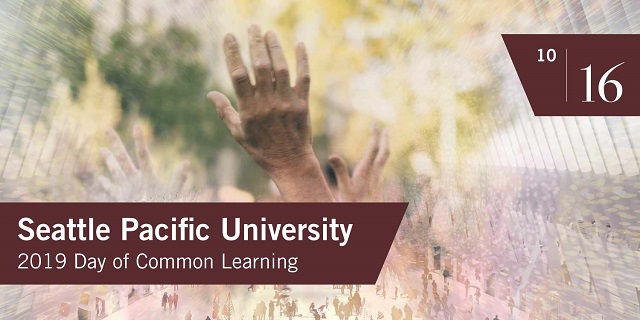
In the Public Eye: Art on the SPU campus
Location
Demaray Hall 254
Keywords
Day of Common Learning
Description
"Public art” – whether it’s art in public, or art funded with public money – has always been hotly contested. Sometimes public artworks are beloved (e.g. The Statue of Liberty). Other times, they are reviled (e.g. Richard Serra’s Tilted Arc). Because they stake a place in public, these artworks always send a broad and explicit message, regardless of the artist’s intent. They can feel like official statements of value on the part of nations, companies, churches or schools. In fact, public art commissions are often awarded with that “messaging power” in mind. In this session, we will explore how public art functions on the SPU campus. And rather than sitting in a classroom, we’ll take a walking tour so we can see works “in the flesh.” Throughout, we’ll ask ourselves these questions: what kind of public message is SPU sending about its values, whether moral, aesthetic or political? And how can the experience of public art on the SPU campus help us understand how public art functions in the wider world?
Copyright Status
http://rightsstatements.org/vocab/InC/1.0/
Additional Rights Information
Copyright held by author(s).
In the Public Eye: Art on the SPU campus
Demaray Hall 254
"Public art” – whether it’s art in public, or art funded with public money – has always been hotly contested. Sometimes public artworks are beloved (e.g. The Statue of Liberty). Other times, they are reviled (e.g. Richard Serra’s Tilted Arc). Because they stake a place in public, these artworks always send a broad and explicit message, regardless of the artist’s intent. They can feel like official statements of value on the part of nations, companies, churches or schools. In fact, public art commissions are often awarded with that “messaging power” in mind. In this session, we will explore how public art functions on the SPU campus. And rather than sitting in a classroom, we’ll take a walking tour so we can see works “in the flesh.” Throughout, we’ll ask ourselves these questions: what kind of public message is SPU sending about its values, whether moral, aesthetic or political? And how can the experience of public art on the SPU campus help us understand how public art functions in the wider world?

